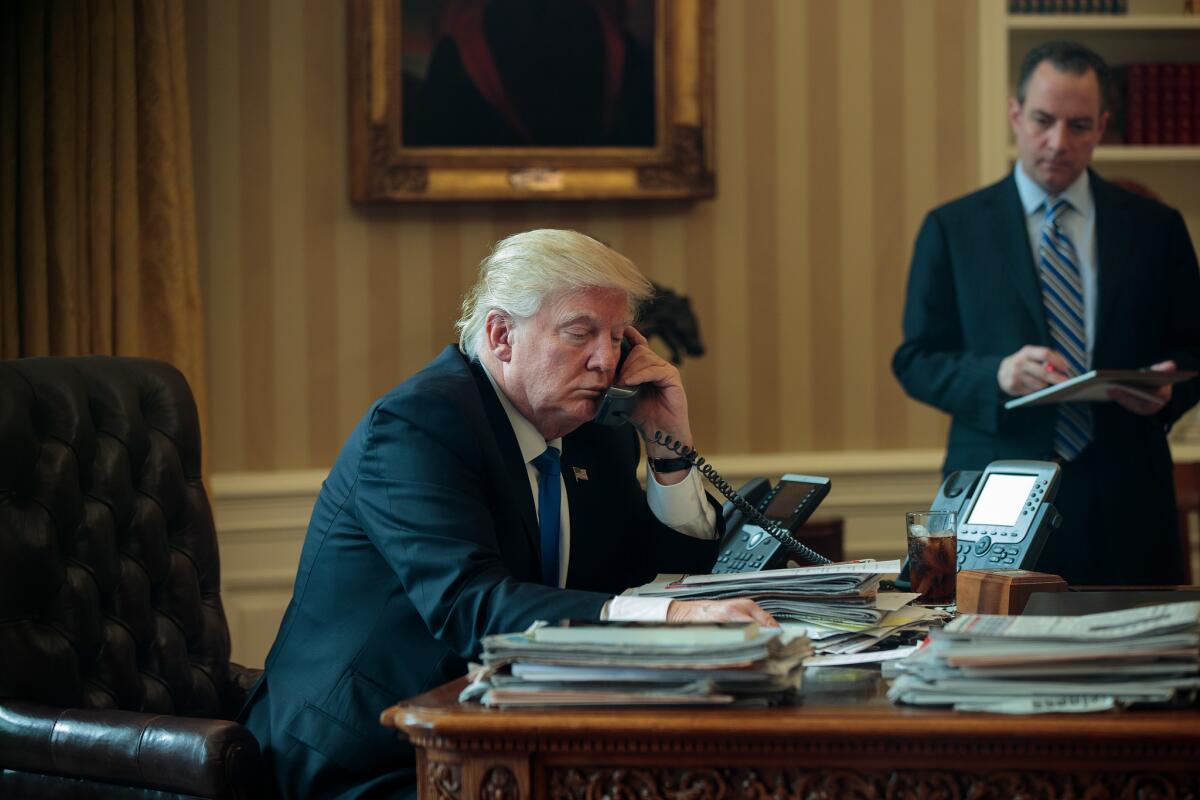Trump and Putin have first official phone conversation amid European anxiety about future relations

Reporting from Washington — President Trump made a flurry of phone calls to world leaders Saturday as he began shaping his new administration’s foreign policy, but none was as anxiously anticipated as the first official president-to-president contact with Russia’s Vladimir Putin.
As his top aides looked on, Trump sat in the Oval Office and spoke with the Russian president on his desk phone, at one point peering out the windows at the White House journalists watching from across the Rose Garden.
The pair discussed combating terrorism, confronting Islamic State militants, the crisis in Ukraine and the Iranian nuclear deal, according to a statement from the Kremlin. Moscow said the topic of easing U.S. sanctions against Russia over its 2014 annexation of Crimea did not come up.
And the men agreed to a set a possible date and venue for a personal meeting, and vowed to maintain “regular personal contacts,” the Kremlin statement said.
In its own statement after the one-hour phone call, the White House said, “The positive call was a significant start to improving the relationship between the United States and Russia that is in need of repair. Both President Trump and President Putin are hopeful that after today’s call the two sides can move quickly to tackle terrorism and other important issues of mutual concern.”
Trump’s budding relationship with Putin is certain to be one of the most closely watched of his administration, both at home and around the world.
Trump has alarmed European leaders and U.S. lawmakers from both parties with his praise and unusually friendly overtures toward the Russian leader, whom much of the world considers an authoritarian who has taken increasingly aggressive actions in Europe and the Middle East.
And Trump’s oft-stated desire to improve relations with Russia comes despite the recent conclusion by American intelligence agencies that Russia hacked into the email systems of U.S. political organizations last year in an audacious bid to interfere with the presidential election and help Trump.
Trump said Friday that having Russia as an ally “would be an asset.” He says Russia can help the U.S. defeat Islamic State militants in Syria, even though Putin’s priority so far in Syria has not been attacking Islamic State but supporting his ally Syrian President Bashar Assad, who is opposed by the U.S.
Trump’s pick for secretary of State, America’s top diplomat, has further cemented the concerns. Rex Tillerson, the former chief executive officer of Exxon Mobil, has acknowledged a close relationship with Putin, honed through years of multibillion-dollar deals for oil exploration and drilling in Russia.
Both Trump and Tillerson have been less than enthusiastic about economic sanctions imposed on Russia after Putin invaded Ukraine and annexed the Crimean peninsula in 2014. Trump even suggested the U.S. could lift the sanctions if Russia agreed to compromise on nuclear arms, an unrelated matter.
Alexei Pushkov, a Russian senator and former chairman of the parliamentary foreign relations committee, said Saturday that the phone call marked the start of a new, closer U.S.-Russia relationship.
“The Trump-Putin conversation will give a new beginning to the fight against [Islamic State], a solution of the crises in Syria, Ukraine. Merkel only has old solutions,” he tweeted, referring to German Chancellor Angela Merkel.
Trump supporters said that his outreach toward Russia was intended to curb Putin’s aggressive behavior.
“I do think they are going into this with a general negotiating tactic: Offer Russia a chance to back off and not be antagonistic,” said James Jay Carafano, a senior fellow at the conservative think tank Heritage Foundation, who briefed Trump on foreign affairs during the transition. “That is different from placating [Putin] and giving him whatever he wants.”
In addition to the chat with Putin, Trump made phone calls Saturday to four other world leaders: Merkel, French President Francois Hollande, Japanese Prime Minister Shinzo Abe and Australian Prime Minister Malcolm Turnbull.
And the president kept up his frenetic pace of executive action by signing new directives that put his own imprint on the national security apparatus.
Trump signed executive actions to reorganize the National Security Council and to direct the joint chiefs of staff to present him with a plan to defeat Islamic State.
He also issued a five-year ban preventing people who work for him from lobbying his administration after they leave it.
The action came right on the heels of an executive order Friday closing U.S. borders to refugees from around the world and temporarily halting immigration from several mostly Muslim countries.
Special correspondent Mansur Mirovalev in Moscow contributed to this report.
ALSO
Confusion and consternation as new ‘extreme vetting’ policy blocks Middle East immigration
As Trump bans Syrian refugees, a look back at when California welcomed 50,000 displaced people
UPDATES:
3:00 p.m.: This article was updated after statements were released by the White House and Kremlin.
This article was originally published at 10 a.m.








